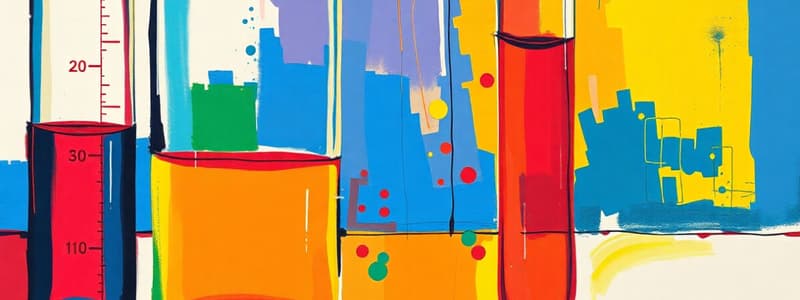Podcast
Questions and Answers
What is the appropriate way to read the volume of liquid in a graduated cylinder?
What is the appropriate way to read the volume of liquid in a graduated cylinder?
- Estimate the value
- Read from the top of the liquid
- Read from the bottom of the meniscus (correct)
- Read at an angle
A convex meniscus occurs when the liquid molecules are attracted to the container.
A convex meniscus occurs when the liquid molecules are attracted to the container.
False (B)
What is the standard formula for measuring the volume of a regular object?
What is the standard formula for measuring the volume of a regular object?
length x width x height
A graduated cylinder shows a reading of _______ mL when the bottom of the meniscus is at the 42.9 mark.
A graduated cylinder shows a reading of _______ mL when the bottom of the meniscus is at the 42.9 mark.
Match the following readings with their correct volumes:
Match the following readings with their correct volumes:
What happens to the shape of the meniscus when the diameter of the graduated cylinder changes?
What happens to the shape of the meniscus when the diameter of the graduated cylinder changes?
To measure accurately, one should position their eyes above the liquid level.
To measure accurately, one should position their eyes above the liquid level.
What is the role of glass in forming the meniscus when measuring water?
What is the role of glass in forming the meniscus when measuring water?
Flashcards
Graduated Cylinder
Graduated Cylinder
A cylinder with markings to measure volume.
Meniscus
Meniscus
The curve of a liquid's surface in a container.
Reading a graduated cylinder
Reading a graduated cylinder
Finding the volume of a liquid using the bottom of the meniscus.
Volume of water in a cylinder
Volume of water in a cylinder
Signup and view all the flashcards
Concave Meniscus
Concave Meniscus
Signup and view all the flashcards
18.0 ml reading
18.0 ml reading
Signup and view all the flashcards
36.5 ml reading
36.5 ml reading
Signup and view all the flashcards
42.9 ml reading
42.9 ml reading
Signup and view all the flashcards
Study Notes
Reading Graduated Cylinders
- Liquids in glass and some plastics curve at the edges of the container.
- Changing the diameter of the cylinder alters the shape of the curve.
- This curve is called the meniscus.
Measuring Volume
- Use graduated cylinders to measure the volume of liquids and objects.
- Read the measurement based on the bottom of the meniscus (curve).
- Ensure the eye is level with the liquid's level when taking measurements.
- Concave menisci occur when liquid molecules attract container molecules (e.g., water in glass).
Reading the Graduated Cylinder
- Position the eye level with the liquid's surface.
- Read the measurement at the bottom of the meniscus.
Measuring Liquid Volumes
- Identify the scale for each cylinder.
- Determine the volume of water in each cylinder based on the meniscus level.
Practice Reading Graduated Cylinders
- Practice reading graduated cylinders to determine the volume measurement.
- Example readings are provided in the accompanying images.
Measuring Solid Volumes
- Regular objects: Volume = length × width × height
- Irregular objects: Use water displacement.
- Measure the amount of water with the object submerged.
- Measure the amount of water without the object.
- Calculate the difference to get the volume.
Studying That Suits You
Use AI to generate personalized quizzes and flashcards to suit your learning preferences.
Related Documents
Description
This quiz focuses on how to measure liquid volumes using graduated cylinders. Learn about the meniscus, how to properly read measurements, and the effects of the cylinder's diameter on the curvature. Practice identifying volumes based on the meniscus to enhance your measurement skills.




